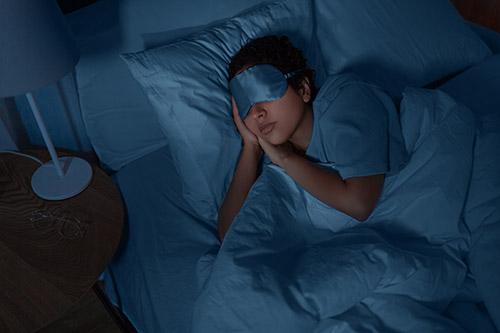Why am I always tired? Why you've got low energy levels and what you can do about it.
Medical review by
Dr Alasdair Scott MBBS FRCS PhDLast updated
Key Article Takeaways
- Tiredness can be due to poor sleep or mental or physical stress.
- But lots of “hidden” medical problems can have tiredness as the only symptom.
- These include low iron & vitamin levels, anaemia, infection, inflammation, thyroid disease and kidney disease.
- Take our Tiredness & Low Energy Blood Test to check for all these conditions in one go.
Tiredness is often your body’s way of telling you to slow down, rest and recover. But if you find you’re asking yourself, “Why am I always tired?”, it might be a sign that something’s not quite right. Being tired all the time can really stop you being your best self and leave you unsure where to turn for help and advice. We’re here to guide you through figuring out why you’re tired, from common issues like sleep quality and quantity to hidden medical conditions and how to test for them. You’ll come away from this with a plan of action to help you understand why you’ve got low energy levels and what you can do about it.
Are you getting enough sleep?
Let’s start with the foundation - how many hours of sleep are you getting each night? The NHS recommends adults sleep for 7 to 9 hours a night1. Consider keeping a sleep diary to check your sleep duration each night. Some phone apps and smart watches can be helpful in tracking this by measuring your movement and heart rate.
Are you not clocking enough hours? Here are some tips that might help.
- Put away screens and devices at least an hour before bedtime
- Have a consistent bedtime and wake up at the same time every day (even at the weekends).
- Your bedroom should be cool, dark and quiet if possible.
- Keep your bedroom just for sleep and sex, avoid working and screen time in bed.
- Avoid caffeine and alcohol in the hours before bedtime.
- Try and exercise during the day or the early evening.
- Avoid large meals just before bedtime.
You might also be having poor quality sleep. Frequent waking or disturbance during the night can lead to feeling like you're tired in the morning even though you clocked enough hours. It makes sense if you’re still tired after 10 hours of poor quality sleep.

Are you stressed?
It can be hard to tell the difference at times between mental exhaustion and physical exhaustion. Is there anything in your life that’s making you feel stressed, anxious or low? All of these things can affect not only your sleep but can be huge drains on your energy.
Take a moment to reflect on your life and see if anything is causing you particular stress or anxiety. Working long hours, difficult life events or challenging relationships can all cause mental fatigue. How is your mood in general - are you feeling low or are there some worries playing on your mind?
Physical stress also causes low energy. Pushing your body to its limits working long shifts and not giving yourself recovery time, or doing extreme exercise and not resting for long enough in-between will sap your energy.
Try making small changes you can stick to in order to reduce daily stress for your mental health and wellbeing. Introducing a regular mindfulness or meditation practice can dramatically improve how you deal with stress, both mental and physical, and help you feel less exhausted and overwhelmed.

Could you have a hidden medical condition?
Are you sleeping well and confident that nothing in your life is causing you particular stress? There are many causes of tiredness, if you are sleeping well and not feeling particularly stressed it could be worth checking to see if there is a medical reason for your fatigue.
There are several conditions that can cause low energy and fatigue without many other symptoms:
- Nutrient deficiencies and anaemia
- Infection
- Inflammation
- Low levels of thyroid hormone
- Reduced kidney function
Nutrient deficiencies and anaemia
Iron and vitamin B12 are crucial building blocks for making your red blood cells, and have a number of other important roles. If you’re low (or deficient) in these nutrients, your red blood cells may not be able to carry enough oxygen around your body. Over time these nutrient deficiencies can develop into anaemia, where you have low haemoglobin in your blood cells. Anaemia can make you feel tired and fatigued.
Low iron and vitamin levels could be due to certain diets. Over 50% of vegans are likely to be deficient in vitamin B12 unless they’re taking supplements and vegetarians are also at higher risk than meat-eaters2. People on a plant-based diet are also more likely to have iron deficiency as plant sources of iron are less well absorbed than animal sources. You can find out more in our article on essential plant-based vitamin tests. Overall, iron deficiency is one of the top three mineral deficiencies in the world3.
Women have a higher chance of anaemia than men for a number of reasons. More than half a billion women were estimated to be anaemic in 20194. Women are more likely to follow a plant-based, vegan or vegetarian diet than men, as seen in surveyed Brits5. Pre-menopausal women also lose blood containing iron during their menstrual cycles. Iron deficiency anaemia in particular is a very common cause of low energy in females. You can find out more in our anaemia article here.
Vitamin D is another important vitamin we’re not getting enough of in the UK. Our skin converts sunlight into vitamin D which is then stored in the liver, we also get a small proportion from food (mainly oily fish). In the winter months (October to March) the UK does not have enough sunlight for us to make vitamin D. Vitamin D deficiency can also have tiredness as the first warning sign so it’s a good idea to take a supplement of 400-1000 International Units (IU) a day during the winter months6. You can read more about vitamin D levels here.
With many of these vitamin and nutrient deficiencies, tiredness can be the only sign. The best way to see if a deficiency is causing your tiredness is to take a blood test, like our Tiredness & Low Energy Blood Test.
Infection
Most infections make you feel unwell for a short duration of up to a week. There are some viruses like the Epstein- Barr virus that causes glandular fever that can cause longer lasting fatigue. Some people have also been affected by what is called Long COVID, symptoms including fatigue lasting a long time after the initial infection7.
Inflammation
Inflammation is your body’s defence response against injury or infection. But sometimes things can go haywire and your immune system can attack your own body by accident. These inflammatory conditions commonly cause tiredness amongst other symptoms.
Inflammatory bowel disease and arthritis are examples of inflammatory conditions that can cause fatigue. Do you have any other unexplained symptoms? Bloating and indigestion? Diarrhoea and stomach pain? Pain in your joints? If you’re feeling tired and resonate with any of these or have other unexplained symptoms, it’s worth getting tested to find out if an inflammatory condition could be to blame.

Low levels of thyroid hormone
Your thyroid gland produces the hormone thyroxine which is important for your metabolism - your body’s energy. If you aren’t producing enough thyroxine, one of the main symptoms can be tiredness.
Thyroid conditions are common - 5% of the population have an underactive thyroid and there may be a further 5% who are estimated to be undiagnosed8. Thyroid problems often make people feel tired and sluggish but can cause a host of other symptoms like changes in weight, mood, skin and bowel habit.
If you have a family history of thyroid conditions, are over age 60 or are a woman, you’re at an increased risk of thyroid disease. A simple finger-prick blood test can make the diagnosis and get you on the path to feeling like you again.
Reduced kidney function
Your kidneys are really important for helping to remove unwanted substances from your body. Extreme fatigue is often one of the only symptoms of reduced kidney function. You can check this out easily with a simple at home test.
Get tested for tiredness
There are lots of things that can be done to bring back your vitality but it's helpful to understand the underlying cause of your tiredness to work out where the best place to start is. At Selph, we have developed a simple, at home blood test you can do to check for and rule out the conditions we've mentioned above.
Our Tiredness & Low Energy Blood Test does exactly that. This comprehensive but simple finger-prick blood screen will test for the common medical causes of tiredness all in one go. You can do it all from the comfort of your home and post the sample to our lab. Our doctors will also help you understand your results and give you an action plan to help you feel like you again.
Get tips on better health
Sign up to our emails on the better way to better health.
We'll keep you up-to-date with the latest research, expert articles and new ways to get more years of better health.


